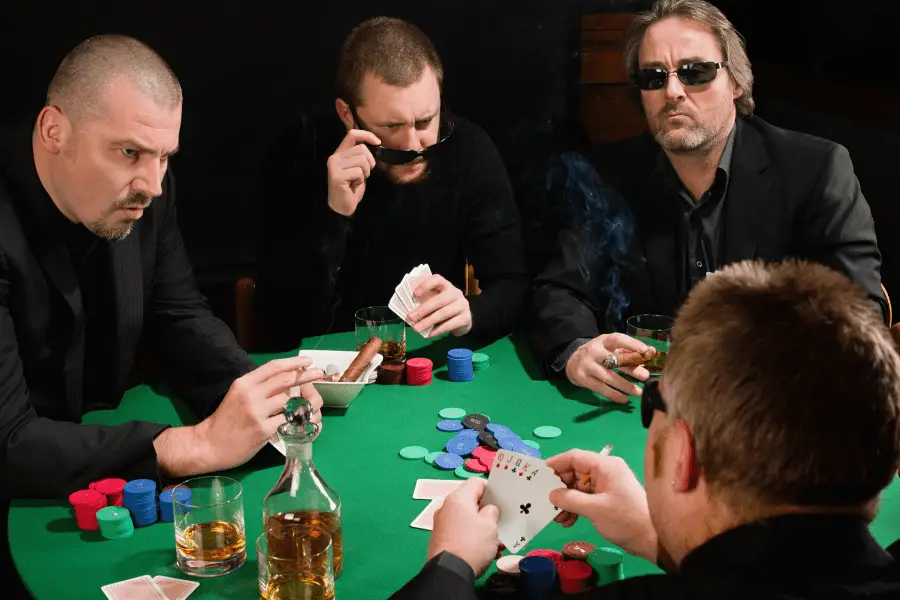
Everyone is playing poker these days, which means there’s a constant demand for learning materials that could help teach people how to play the game. Since some of these books are sold for a lot of money, there’s been several debates on how effective they are. If you’re wondering the same thing, this article will help answer your questions and give you more insight into poker books and precisely what they offer.
Reading poker books helps you be a better player. Although reading them is not the most efficient way and you need to be careful they are up to date. The right poker books contain information on how to play the game, strategies, concepts, and playing styles that could help enhance a player’s overall gameplay.
These authors bring their wealth of knowledge and experience to the pages of a book and depending on what you’re looking for, and this information could help you in no small way.
Books might be helpful, but are they the best way to sharpen your poker skills? If so, then what kind of book do you need to read to improve your skills? Several questions may cross your mind as you read this article, and I’ll try to give you a comprehensive answer.
On this link, you can find a list of the best books for poker beginners.
If you on the other hand focus on live games, then I have an article with a detailed list of the best books for live poker players. Some of them focus on reading the poker player’s body language to maximize the winnings and make jaw-dropping calls with your bluff catchers.
How Effective are Poker Books?
While there’s no doubt about books being helpful to players who are either learning or trying to master the game, the bigger question is to what degree? Most books promise a quick and tremendous turnaround for readers, but do they deliver on this promise?

In a world where there are bits and pieces of information wherever you turn, people are no longer just looking for any information, and they want information that can add tremendous value to their lives.
Take the example of a kid who needs to buy 5 dollars worth of candy but only has two dollars in his pocket. Does he have any money? Yes, he does! Can his money buy the amount of candy he wants? No! It is in the same vein we consider the value of the information we get from poker books. Purchasing a book just because it contains poker related information is not enough. You need the information to turn you into a good player, and sadly, not all poker books can provide that.
There are several kinds of poker books on the market. Some were written in the 90s while others are relatively recent, some are about strategies and how to improve your gameplay, while others are more like a starter’s pack for beginners. Before buying any poker book, you must ensure you’re buying a book that fits your need and can truly take your game to the next level. Later in this article, I’ll give a few tips on how to buy the right poker book.
Poker strategy books shouldn’t be older than a few years
If you are looking for poker strategy books then it is very important that all the information is up to date. If on the other hand just want some evergreen poker information, then books written 20 years ago will be just fine.
You might get away with a few years old strategy poker books for live poker games. But when it comes to online, the whole ecosystem is changing rapidly. Anything more than 2-3 years and a lot of the strategy might be outdated already on low limits and above (NL100 and above).
While on online micro stakes (up to NL25) it is fine if a book is good and 5 or more years old. Majority of its principles will still apply.
Just remember: don’t do poker reading just for the sake of reading a strategy book. Make notes of any new strategy principles and then apply each section one by one, until you understand it properly. Then you are ready to implement a new section to your strategy.
For example work on flat calling the big blind vs steals from cutoff and button. When you have a feeling you understand in and know the ranges, then you are ready to move on next part of the strategy (3bet strategy on big blind vs cutoff and button steals).
Why Do Some Players Shun Poker Books?
Unfortunately for authors, not all poker players are thrilled with the idea of enhancing their poker skills by reading books. The following reasons will explain why some players shun poker books.
The Internet
Be honest, when you’re looking for any information, where is the first place you look? Do you run off to a library to search for a book that contains the information you want or pull out your phone to do a google search? It’s an easy answer. In the 80s and 90s, when people couldn’t go on the internet to find just about anything they needed, poker books were more relevant.
However, with the information they need just a click away, picking up a book to go through each page hoping to get the information they want appears to be a chore many poker players don’t fancy.
Apart from the articles you’ll find on the internet, you can also watch various tutorial videos from poker players all over the world, giving tips on strategy, concept, and general gameplay. With that much information on the internet, you can understand why some poker players don’t bother with poker books.
Some Players Don’t Believe in the Potency of Poker Books
There are players out there who believe the best way to improve their poker skills is by garnering real game experience. The belief is that the more you play the game, the better you become at it. While there’s some truth in it, the problem with that ideology is that your inexperience will cost you a lot of money. Also, if all you do is play without ever making any conscious effort to work on your game, there’s only a small chance that your game will improve over time.
Also, not many people are thrilled with the idea of reading. I’ve met poker players who believe the game is far too flexible to base your strategy on the guidance and rules from a few authors. These players think poker books put people in a box with their numerous dos and don’ts, a scenario they believe is counterproductive as the game of poker promotes fluidity.
This school of thought preaches against learning poker mantras and sticking with perceived rock-solid strategies from a book as they believe it inhibits a player’s flexibility and dampens their ability to evolve their game over time.
Online Poker Revolution
People who play online poker are not so big on books because some of them were written well before internet poker became a thing. Since playing online is a bit different from playing live on a table with opponents, there’s not much a book that teaches standard poker strategies can do to help. A good example is spotting physical tells in opponents.
In a regular tournament or cash poker game, players study each other to try, and notice tells from their body language and emotional reaction to in-game actions. However, it’s impossible to catch physical tells in online poker, which means players have to use different strategies to spot online tells.
In online games, HUD’s are the ones that give you a lot more information than a naked eye would in live games. They are especially popular amongst poker pros.
They’re Expensive
As good as poker books are, you can get a good deal of information from an online poker forum, which should cost you next to nothing. One of the most popular ones is TwoPlusTwo. However, owning a poker book may set you back a couple of dollars, and if you’re cash strapped, it doesn’t seem like the right thing to do. Sometimes you may have to buy a few books to get all the information you need, which will cost you even more money.

Some players would instead get all the information they need by watching videos and reading poker articles online. There are even free websites likes this one, that has hundreds of videos to make tour game better. At the same time, it is also smart to invest your money on hiring a poker coach who will present a more hands-on approach.
If you want to get the best poker video training that is out there and always up to date, then check out this article.
Good free resources are also discord channels. I have made detailed research and made an article about the best discord channels.
Factors to Consider Before Buying a Poker Book
To ensure you’re not wasting your money, there are several factors to consider before buying a poker book from Amazon or your local book store. They are as follows:
- The Author’s Profile
You’re going to find a lot of poker books out there that will promise incredible content and fool-proof strategies to make you a successful poker player in the shortest time possible. Unfortunately, the sad reality is that every author will say the right words to get you to whip out your credit card to pay for their book, which means you’ll come across several books that are not worth your time or money.
So how do you ensure you don’t buy poker book that isn’t going to help your cause? Research the author! Some of the best poker books available today where written by great poker players who have enjoyed successful poker careers. In this game, experience and results are everything. A successful author will be able to teach you valuable skills and techniques that should help raise your game.
The successful author is that much better than some guy who wants to make money off naive newbies because his success story certifies his methods and strategies. An excellent example of a successful poker player who shared the secrets of his successful poker career through his books is Doyle Brunson, and its no wonder his writings are regarded as some of the best poker books on the market today.
- Your Immediate Needs
From strategy guides to biographies, there are several kinds of poker books on the market, and your choice of a book should be determined by what you’re trying to achieve. If you’re going to the market to get a poker book to read for entertainment’s sake while hoping to learn a thing or two that could help your game, several poker biography books should work just fine.
An excellent example of one such book is Check-Raising the Devil by Mike “The Mouth” Matusow detailing his rise to fame from humble beginnings with poker being the central theme. On the other hand, if you’re a newbie and on the look for a poker book to show you the ropes, books like Getting Started in Hold’em by Ed Miller delivers on its promise. Hence, it is essential to only go for books that address your immediate needs.
- User Review
Don’t be so quick to believe what you read on the back cover of a poker book, do a little research before whipping out your credit card. Ask a friend, neighbor, or fellow players on your online poker forum. You may even ask your online buddies to recommend an excellent book that has helped them in the past.
If you already have a book in mind, you can go to top online stores to read user reviews. If the feedback is positive, then you’re good to go, but if there are more negative reviews, then you may want to reconsider your options. Apart from your friends, you may also ask your coach or mentor to recommend a few books that could help improve your game.
Top 5 poker Books You Need to Buy
If the idea of buying a poker book to improve your gameplay appeals to you, there are a few suggestions that could seriously help enhance your poker skills. Below are 5 books written by successful poker players that should help you achieve success as well. One added on end as a BONUS, focuses on another vital aspect of every poker player. These books have worked for other poker players and should work for you as well. They are:
- Every Hand Revealed by Gus Hansen
Either for live or online games.
Regarded as one of the best poker players in the world, Gus Hansen was ranked 11th overall in the Global Poker Index while at the peak of his powers. He has won the World Poker Tour 3 times, Poker Superstars Invitational Tournament season one, and Aussie Millions in 2007. It is his experience in the main Event of Aussie Millions that inspired this incredible book.
In the tournament, Gus Hansen saw off 700 players to claim top spot and win $1.2M in prize money. Every Hand is a book that explicitly describes every hand he played in that tournament, as well as the reason behind every decision he took. With over 300 hands described in this book, there’s plenty to learn from Gus Hansen’s personal experience.
It’s a great book meant for live play.
With 7 in the money World Series of Poker finishes, Mika Caro is a highly respected professional poker player. He brings his wealth of experience to the pages of a book with Caro’s Book of Poker Tells. With about 320 pages to flip through, this book teaches players how to spot physical tells from your opponent‘s body language and reaction to each action on a table.
There are about 20 different physical tells in the book that are exhaustively explained, including how to act on them in different situations. Another essential information players would certainly enjoy reading in this book is how to identify opponents who are deliberately giving fake tells to fool you.
- The Raiser’s Edge: Tournament-Poker Strategies for Today’s Aggressive Game by Bertrand “ElkY
Either for live or online games, but mostly live.
Grospellier has earned over $13 million in tournament live winnings. Apart from being a great poker player, he’s also well known for his ability to share his wealth of knowledge with other poker players in a way that they can easily understand. The Raiser’s edge is mostly about Loose Aggressive poker style and how to apply this approach.
More importantly, it teaches readers how to play against an opponent using this style. The Raiser’s Edge is a great asset to poker players looking to play tournament poker as the strategy it describes is popular amongst professional poker players. This book is not all about Loose aggressive style as a chapter is also dedicated to spotting physical tells.
Great for beginners. Either for live or online games.
David Sklansky has won the World Series of Poker bracelet 3 times while he has also earned over 1.3 million dollars playing live poker. With such a huge poker career, you can expect a classic, and that is exactly what you get when buying The Theory of Poker. Released about 25 years ago, this book should be old and irrelevant considering how much things have changed in the past two decades.
Yet, The Theory of Poker is still as relevant now as it was back in the 90s. The book discusses various logical, mathematical, and fundamental concepts and theories applicable to multiple forms of poker. Basically, this book is an idiot’s guide to learning how to play poker. With 14 books to his name, David Sklansky is something of an authority in poker, and if you’re going to read any poker book, you may want to check out his books.
Great for beginners. Either for live or online games.
Dan Harrington won the WSOP main event in 1995 and has since enjoyed much success in poker with earnings towering above $6.5m. This book comes in three volumes. Volume 1 was tagged ”strategic play” and was one of the first publications to discussed several strategic concepts in tournament poker.
These days, tournament players take their M-ratios seriously because Dan Harrington introduced this concept in Harrington on Hold’em. The 2nd Volume is named ”endgame,” and it’s a book dedicated to discussing how to navigate a poker tournament’s final stages. Volume 3 is described as a workbook that presents readers with scenarios where they can apply the concepts learned from the first two books.
Great for beginners. Mostly for online games, but can easily be applied to live games also.
As good as your knowledge of the game is, it won’t help you much if you get frustrated easily. This book deals with the mental side of poker instead of the actual strategy advice.
If you want to be a serious poker player, this book is a must-read. It goes into how to play in the zone to play your best possible game. How to recognize you are about to tilt and how to avoid it. Also, the important note that it explains in detail is how to play your worst game in the best possible way.
Even many good players will play bad when it is not their day. This book explains to you what to focus on that even on a bad day, your game will be decent enough, and you won’t lose minimum amounts of money because of your bad play.
If you are a new player, then the most value to you will bring The Theory of Poker, Harrington on Hold’em, and The mental Game of Poker. Others will be also valuable to you, but maybe it is best to start with a solid foundation that these three books will give you.
If you are not so much into reading the books, you can join PokerStrategy. That is a free coaching poker site, where you are given $50 for free once you complete their basic quiz (not applicable to USA players anymore). At first, after completing the quiz, you get access to basic videos, and once you play more, you will unlock more and more videos.
Are Poker Books the Best Way to Improve Your Skills?
The knowledge they say is power. No doubt, books are a great help and can help enhance your strategies and improve your gameplay. However, we can’t quite consider reading books as the most effective way to improve your skills. If you want quick and effective results, your best bet will always be to hire a poker coach or join a poker training site (here is a list of the best ones).
A good poker coach can walk you through the game’s fundamental concepts while helping to review your hands and identify the weaknesses in your gameplay. Even when you do decide to invest in poker books, your coach can help you come up with a few solid options that he/she believes will help enhance your game. But good coaches are expensive. In my poker career, I have spent more than $10.000 on poker coaches that helped me with various parts of my poker game.
If you want to get a poker coach be careful! Not every coach will be the right match for you plus there is a lot of “fake” poker coaches, who definitely aren’t worth your money.
Final Verdict
While not all poker players read books, there’s no doubt as to how much help you can get from the pages of a good poker book. A few good books have been recommended in this article, and there are many more out there that are worth every penny.
Lastly, reading books doesn’t have to be the only way. You can combine your books by watching videos of strategies and concepts or getting lessons from a poker coach.





